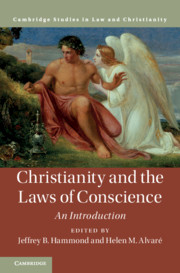Book contents
- Christianity and the Laws of Conscience
- Law and Christianity
- Christianity and the Laws of Conscience
- Copyright page
- Dedication
- Contents
- Contributors
- Acknowledgments
- Introduction
- Part I Themes in Understandings of Conscience in Christianity
- Part II Conscience According to Major Figures and Traditions
- 5 Conscience in the Early Church Fathers
- 6 St. Thomas Aquinas on Conscience
- 7 Reforming the Conscience
- 8 Toward a Theology of a Redeemed Conscience
- 9 Pierre Bayle
- 10 Freedom of Conscience and Its Right to Constitutional Protection
- 11 Jonathan Edwards on Conscience
- 12 Obeying God Rather Than Men
- 13 Mormonism and Conscience
- 14 Culture and Conscience in the Thought of Joseph Ratzinger, Pope Benedict XVI
- Part III Applied Topics in Law and Conscience
- Index
- References
10 - Freedom of Conscience and Its Right to Constitutional Protection
The Contribution of Roger Williams*
from Part II - Conscience According to Major Figures and Traditions
Published online by Cambridge University Press: 12 June 2021
- Christianity and the Laws of Conscience
- Law and Christianity
- Christianity and the Laws of Conscience
- Copyright page
- Dedication
- Contents
- Contributors
- Acknowledgments
- Introduction
- Part I Themes in Understandings of Conscience in Christianity
- Part II Conscience According to Major Figures and Traditions
- 5 Conscience in the Early Church Fathers
- 6 St. Thomas Aquinas on Conscience
- 7 Reforming the Conscience
- 8 Toward a Theology of a Redeemed Conscience
- 9 Pierre Bayle
- 10 Freedom of Conscience and Its Right to Constitutional Protection
- 11 Jonathan Edwards on Conscience
- 12 Obeying God Rather Than Men
- 13 Mormonism and Conscience
- 14 Culture and Conscience in the Thought of Joseph Ratzinger, Pope Benedict XVI
- Part III Applied Topics in Law and Conscience
- Index
- References
Summary
David Little presents Roger Williams as a seventeenth-century champion of conscience. Williams was expelled from Massachusetts Bay that ostensibly prized free exercise, but in fact recognized it only within narrow bands of orthodoxy. Williams thereafter prized freedom of conscience in the charter for the Providence Plantations and Rhode Island. A central principle for Williams is the distinction between the “inward” and “external” fora. The “inward forum” is the conscience, a “spiritual power” changeable by reason and persuasion. The “external forum” is “outward behavior,” meaning actions that can be coerced by the governing authority through force, in order to protect life, property, and other interests. Williams provocatively labeled coercive acts against conscience as “soul rape” and “piracy,” indicating how deeply and intimately these violated the person. Williams maintained a fruitful relationship with the Narangansett Indians, having shown them great respect, as the people who provided him refuge when he was expelled from Massachusetts Bay. He didn’t co-opt their government, and fully respected their ability to choose religion (or not), in the quiet of their own internal fora.
Keywords
- Type
- Chapter
- Information
- Christianity and the Laws of ConscienceAn Introduction, pp. 187 - 207Publisher: Cambridge University PressPrint publication year: 2021

